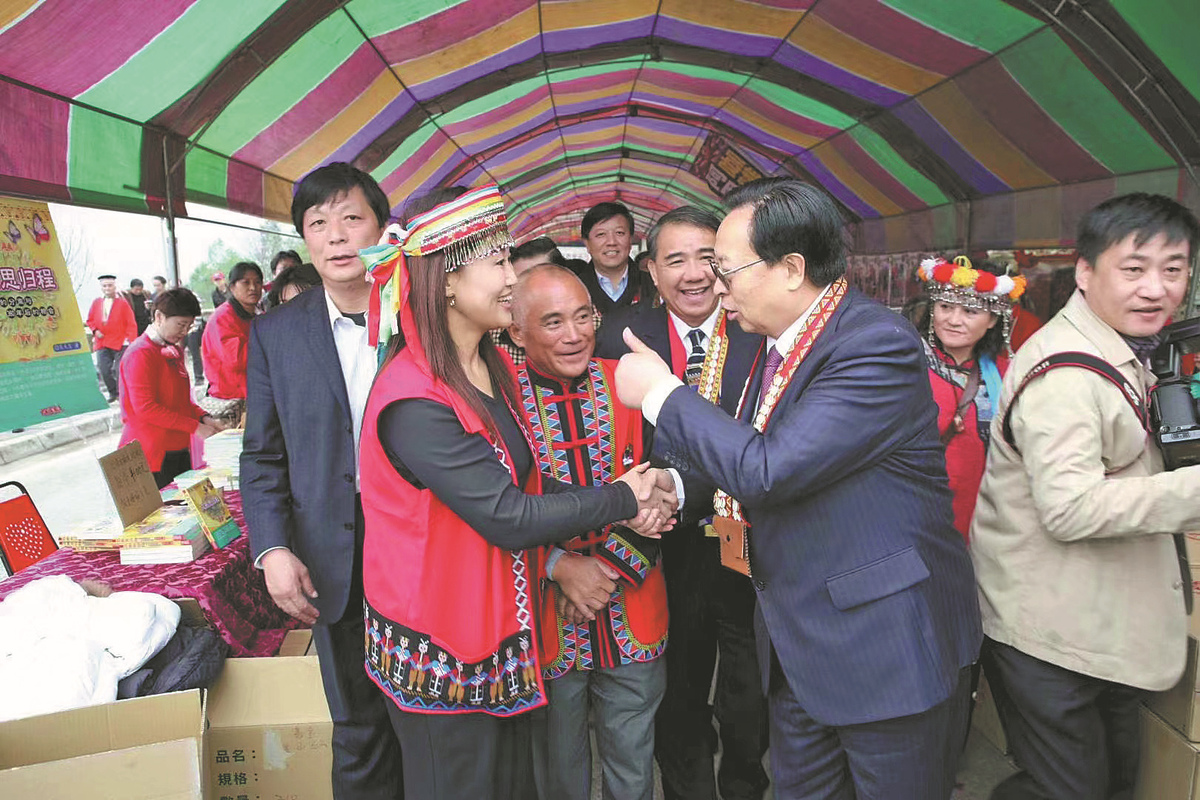'Taiwan village' residents link with long-lost relatives


Community becomes base for cross-Strait exchanges
In Dengzhou, Henan province, lies a village with a unique history that connects it to Taiwan.
Shangying village, also known as "Taiwan village", is home to descendants of the Gaoshan ethnic group that migrated from Taiwan centuries ago.
They have distinct physical features — high cheekbones and slightly darker skin — that are similar to the indigenous people of Taiwan.
For generations, the Gaoshan people have continued their customs in the village in Henan. However, due to cross-Strait tensions, they had long lost contact with their Gaoshan relatives in Taiwan.
But with the shared roots and bloodstream between the two sides of the Taiwan Strait, the villagers in Henan — with the help of Wu Tienhsi, a Taiwan businesswoman residing on the Chinese mainland — have finally succeeded in reconnecting with their long-lost relatives.
Today, the village has become a base for cultural exchanges between the two sides, promoting people-to-people exchanges and cooperation.
Wu first heard of the village in the early 2000s. Out of curiosity, she did some research and discovered that the villagers' ancestors were followers of national hero Zheng Chenggong, who recaptured what was then Dutch-occupied Taiwan during the 17th century.
They followed the general during his military campaigns on the mainland and eventually settled down in what is now Dengzhou, where they claimed the land and had children. Today, the village has over 580 households and more than 2,600 descendants of Taiwan's Gaoshan people.
The family trees of the Shangying villagers depict the history of their Gaoshan ancestors who migrated from Taiwan to Dengzhou, and popular folk songs in the village mention famous scenic sites such as the Alishan Mountain and Sun Moon Lake in Taiwan.
Wu said when she first encountered Gaoshan people in the village, she was moved to see that they exhibited many of the same traits of Taiwan's indigenous people.
"I will never forget the longing in the villagers' eyes, wishing to find their relatives in Taiwan," she said, adding that she could understand the pain of being unable to reunite with their loved ones, as her family had gone through a similar experience.
Born and raised in Taiwan, Wu's parents told her that their family is from Henan. They fled to Taiwan due to the turmoil caused by the War of Liberation (1946-49), and for 40 years, they had no contact with their family members on the mainland. However, their longing for their homeland never faded.
"When I was young, I often saw my parents crying because they missed their hometown. At that time, I didn't understand it until 1987, when I returned to our hometown with them," Wu said. "My mother fell to her knees when she finally saw my grandma again."
In the early 1990s, she and her parents settled down in Henan and started businesses there to help their relatives improve their lives.
"Because of my own experience, I really want to help the people in Taiwan village in Henan find their relatives in Taiwan," she said.
In 2005, Wu boarded a flight to Taiwan to begin searching for relatives. For 10 days, she searched nearly all the areas on the island where the Gaoshan had resided, but there were no clues.
News soon spread about Wu helping Gaoshan descendants from the mainland to Taiwan to search for their relatives. A Gaoshan woman surnamed Chen contacted Wu and said she might be one of the people Wu was looking for. Wu arranged a meeting and confirmed Chen's background.
This experience made Wu feel that there was a fateful connection between herself and the Taiwan village in Henan. Since the 2005 trip, she has continued to travel between the mainland and Taiwan, fostering contacts and connections with Gaoshan people on both sides of the Strait.
In 2009, Taiwan Gaoshan people officially announced plans to recognize the people in Taiwan village as part of their ethnic group. Wu said the heart-wrenching scenes of their reunions remain etched in her memory, further solidifying her determination to act as a "matchmaker" across the Strait.
"Searching and reuniting with relatives on the other side of the Strait is an eternal issue for people on both sides," she said, adding that in recent years she has promoted more exchanges between people on both sides who have the same family names.
Wu is currently working hard to promote Taiwan village as a base for cultural exchanges between the two sides, and she hopes to invite artisans of ethnic groups in Taiwan to display traditional crafts in the village to boost communications.
She also invites Taiwan entrepreneurs, especially young people, to come to the mainland, as she believes that the mainland offers better development prospects.
zhangyi1@chinadaily.com.cn
- China's commercial rocket maker puts two satellites into orbit
- People in Taiwan commemorate victims of White Terror period
- China successfully launches new test satellites
- China launches Lijian 1 Y9 carrier rocket
- First cross-border event debuts at the National Games
- China Focus: National Games enhances coordination under 'one country, two systems'





































